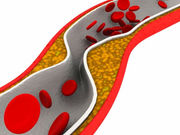In a model including follow-up CAC, CAC progression not linked with total CVD events
THURSDAY, July 7, 2016 (HealthDay News) — Coronary artery calcification (CAC) progression is no better for predicting cardiovascular disease (CVD) events than follow-up CAC, according to a study published in the June issue of the Journal of the American College of Cardiology: Cardiovascular Imaging.
Nina B. Radford, M.D., from the Cooper Clinic in Dallas, and colleagues examined whether CAC progression is a useful predictor of future CVD events in a prospective observational study involving 5,933 participants free of CVD.
The researchers detected CAC in 48 percent of individuals at baseline. Participants underwent two scans, with an average time between scans of 3.5±2 years. During a mean follow-up of 7.3 years, 161 individuals experienced a total CVD event after their second scan. There was a significant correlation between CAC progression and total CVD events (hazard ratio, 1.14; 95 percent confidence interval, 1.01 to 1.3 per interquartile range) in a model including baseline CAC; the relative contribution of CAC progression versus baseline CAC was small. In the model including follow-up rather than baseline CAC, CAC progression was not associated with total CVD events (hazard ratio, 1.05; 95 percent confidence interval, 0.92 to 1.21). Performance was similar for a model that included follow-up CAC alone and a model that included baseline CAC and CAC progression.
“These findings imply that if serial CAC scanning is performed, the latest scan should be used for risk assessment, and in this context, CAC progression provides no additional prognostic information,” the authors write.
Copyright © 2016 HealthDay. All rights reserved.








